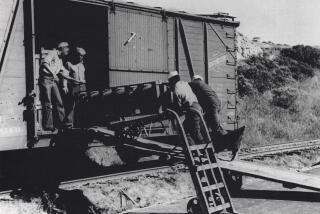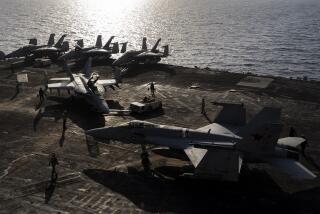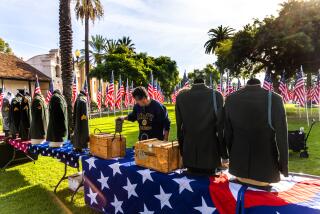Seabees Given an Emotional Send-Off
- Share via
There’s never a good time to go off to war, but for 100 Seabees at Port Hueneme, Monday afternoon was a particularly bad one.
The previous week had been among the deadliest for U.S. forces since the fighting in Iraq started. Foreign civilians were being kidnapped. Cities were erupting in anti-American hatred. At home, polls showed a growing number of people questioning the war.
The mood at Naval Base Ventura County was subdued. Seabees from Naval Mobile Construction Battalion Three milled around in a parking lot outside a base theater. Clad in khaki camouflage uniforms and desert boots, some hugged wives and children, girlfriends and parents. None knew when they would be back.
“I’m going through a whole smorgasbord of emotions,” said Jason Whalen, 23, of Exeter, R.I. “I’m proud, a little nervous, a little scared.”
Whalen’s wife, Gloria, 22, was beside him under a tree, rocking their wide-eyed, 5-month-old daughter, Sophia, in her arms. Gloria said she was doing her best not to cry.
The couple had known that Jason would be shipped to Iraq sometime, but that didn’t make leaving any easier.
“We tried to prepare for it,” he said. “But you really can’t.”
None of the Seabees had served in Iraq, although many of their buddies on base had been there and back. Their top officer, Lt. Cmdr. Bruce Nevel, said the group was focused more on the details of departure than on the ups and downs of hourly bulletins from Baghdad and Fallouja.
“Most of them want to go and get into it,” he said. “We want to do what we can to help out.”
A group of 100 from the same battalion shoved off for Iraq last week.
The Seabees were established in World War II, with the motto “We Build, We Fight.” In Iraq, Nevel said, the Seabees do the kind of things they do everywhere: build military camps, repair bridges, get power plants up and running, repave runways, patch up schools, fix what needs to be fixed. No Seabee based at Port Hueneme has died in Iraq, according to a base spokeswoman, but their work often places them in volatile areas.
Brandon Hoekstra, 20, of Vancouver, Wash., had no second thoughts about his mission, despite the grimness of the daily news. Since April 4, about 60 U.S. troops have died in Iraq.
“It’s war,” he said. “It’s not pretty. But I know that what I’m doing is right.”
Hoekstra steeled himself for his time in the field the way many military men have before him: He married his sweetheart.
His wife of 18 days, college student Jennifer Hoekstra, 22, of Camarillo, clung to him, misting up. The two had planned to wed next year, but the call to arms made a Thursday in late March more attractive.
Some older men had said their goodbyes earlier.
For Nathaniel Poke, 42, the trip to Iraq would be his 11th deployment in 16 years. His wife and their four children, ages 12 to 18, live on base at Point Mugu.
“We said goodbye when they dropped me off here,” he said. “My wife knew that I have to be able to stay focused.”
Derrick Brooks, 36, of Wichita, Kan., has four kids -- his range from 7 to 13 -- at home. A reservist who works as a manager for an inventory control company in civilian life, Brooks had almost been called up for deployment many times in his 18-year reserve career.
“This is the first time,” he said. “In a way, it’s kind of a relief that it’s finally happened.”
After an hour or so, the Seabees were mustered into three companies -- Delta Force, Echo Force and Foxtrot Force -- on the asphalt. They carried M-16 rifles, some fitted with grenade launchers.
In silence, they marched single-file into the theater for final orders. Later, they would board a fleet of white school buses for the short ride to Point Mugu, where they would climb onto waiting planes for the long trip to points east.
More to Read
Sign up for Essential California
The most important California stories and recommendations in your inbox every morning.
You may occasionally receive promotional content from the Los Angeles Times.














